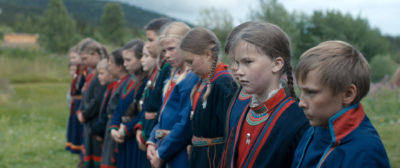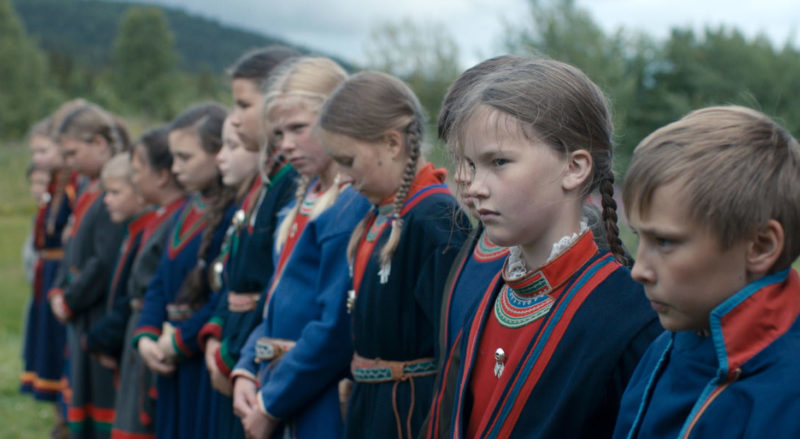INTERVIEW: ‘Sami Blood’ follows girl breaking from tradition in Sweden

Amanda Kernell’s debut feature, Sami Blood, follows a young indigenous Lapland girl in Sweden who defies her family’s history and traditions to venture away from her house and boarding school. Along the way, she faces discrimination and is subject to a eugenics study that seeks to document her “race biology.”
She’s cut off from the rest of society and seen as inferior, and yet she yearns to break from her mother, sister and the Sami people. Once she breaks away, she hides the fact that she comes from indigenous reindeer herders and thus denies her family and upbringing.
The movie stars Lene Cecilia Sparrok, who is Sami herself and also making her film debut, and it’s quite a debut. Most of the film’s 110 minutes focus on her performance as Elle. The camera follows her as she attends a dance in the local neighborhood and heads away from her family to find a boyfriend and perhaps a new life in Sweden. Elle’s decision to leave her Sami upbringing and hide her cultural past haunts her for the rest of her life.
Sami Blood is currently playing at New York City’s Landmark Sunshine Cinema with more American markets to come.
The movie was partially inspired by Kernell’s own family and her roots in Sami culture. The elders in her family always knew “that Sami was their first and only language as a child, and they grew up with nomadic reindeer herding,” she said. “But then they went to our residential schools where only Swedish was allowed, and now many of them have left their old life and are now Swedish. And we can’t talk about their past, so since there’s so much that is hard to talk about, I guess I always wondered, can you become another person? And what does it do to you to cut off ties with your family, and your background and your past? And what does it do to you growing up in a time where you were seen as an inferior race, and how can you handle that? And how can you not internalize that? And how do you keep your dignity in a system? So I wanted to make a declaration of love to this older generation, those who left everything behind and those who stayed in the Sami community.”
In addition, Kernell wanted the narrative to focus on two sisters and what it means to lose a family member who runs away. Sparrok’s character of Elle has a sister in the movie, and the role is played by Sparrok’s actual sister in real life. This gives Sami Blood a feeling of authenticity.
“She’s amazing,” the writer-director said of Sparrok’s acting. “She hasn’t acted before. … I wanted preferably two real sisters who could speak this language and who have grown up with reindeer herding because I wanted them to be able to use a knife, handle reindeer, handle a lasso and so on. Most teenage girls can, and I wanted them to have this strength and integrity. I don’t know what to call it, maybe dignity that I see and admire in all older women in my family. We say that they’re like the mountain birch. You know, the small birches that grow on mountains. They never break. They just bend, so I wanted to find someone who had that.”
Kernell said some of the unfortunate history of eugenics in her country, which served as a precursor to the Nazis using the practice in World War II, is still unknown to many people, and that makes Sami Blood a revealing and devastating film, one that has won acclaim at the Sundance, Venice, Berlin and Toronto film festivals.
“I’d say it’s not known in the Swedish community,” the filmmaker said. “We don’t read about it in school. We don’t read about the state institute of racial biology, which we had the first one in the world, way before the Germans and that inspired the Germans. And we don’t read about our Sami history. We read more about Native Americans than we read about our own indigenous population, but since I am from a Sami family, we have all the books.”
Kernell grew up knowing her history and learning about Sami singing, reindeer herding and the language. Still, she had to conduct a lot of research to build this story.
“I had to do a lot of research because I felt a responsibility to make it right,” she said. “I did a lot of interviews with elders because there’s not a lot of written material how it was to be in these schools. Of course, there’s a lot of written material about the state institute of racial biology and how they did these exams and why and the whole politics in Sweden. … They believed Sami was an inferior race and on the lower level of evolution.”
She added: “Many [Sami] schools were not allowed to listen to radio, separated from Swedish kids in different villages because it was believed that if they get a taste for civilization, they will be tempted, and they are not fit for that. It was important for me to make the details right, but I make fiction. So what intrigues me was also to interview people about their memories, those that left who were not that old. They would probably never go back to the area where they’re from. What do they miss? What are the moments they miss from their old life? I wanted to capture how it feels rather than how it was or how it is, but I feel it’s such a great responsibility since this hasn’t been told before.”
By John Soltes / Publisher / John@HollywoodSoapbox.com
Sami Blood is currently playing at New York City’s Landmark Sunshine Cinema with more markets to come. Click here for a trailer of the film.

